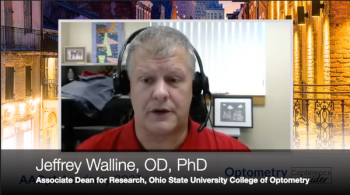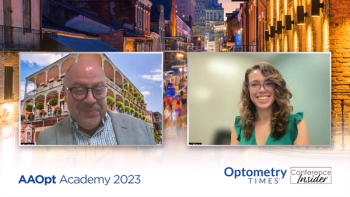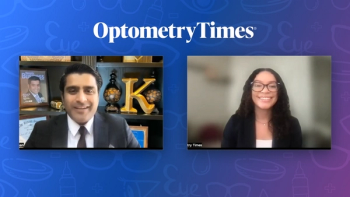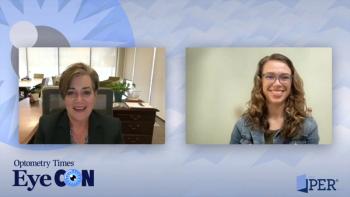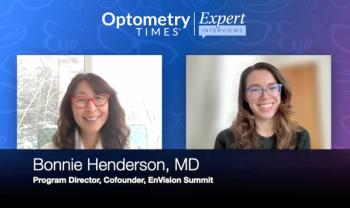
Community care: How service changes throughout a career
Jill Saxon, OD, executive director of professional strategy at Bausch + Lomb, shares the story of her career and the highlights of working within the industry.
Podcast transcript
Emily Kaiser:
Hi everyone and welcome to Optometry Times On Air. I'm here with Jill Saxon, the Executive Director of Professional Strategy at Bausch + Lomb, and she's here to talk a little bit about her career and her journey and what it's like to be a professional in this industry. So let's jump on in. Welcome, Dr. Saxon, thank you so much for taking the time to be here.
Jill Saxon, OD:
Thanks so much. I'm glad to be here and welcome everyone to the podcast. It's a great opportunity to be able to share your story and hopefully inspire some of you to do things a little bit different than what you might be doing today.
Kaiser:
So first, can you tell us a little bit about yourself and your career and how you became the professional that you are today?
Saxon:
For sure, I'd be happy to. I grew up in Randolph, New Jersey, where I was fortunate to have the opportunity to be surrounded by family, by friends, extended family, and friends that are just like family. But had also the opportunity to be exposed to people that were in many different types of careers, different industries, different roles. And as a young child even, I noticed that the opportunities seem to be everywhere. And frankly, the quote of, "The world is my oyster," is exactly what it felt like. Anything that I wanted to do, I would have the opportunity potentially to do as I grew up. So then, of course, as a young girl, I thought about it. and I knew I needed to find something that I loved, that I really loved and had passion for. And ultimately, for me, that was something I didn't know at the time, but knew that I needed to make a difference, a meaningful impact on the world.
So fast forward, I decided to become an optometrist because quite literally, optometry is part of my family. My father, I have two uncles, my younger brother—we're all optometrists. And I saw through them through my family, the positive impact that we as a profession could have on others, on all of our patients, and even beyond, which was inspiring, and something that I wanted the opportunity to do in my life. And ultimately, who I am today is a direct result of every single experience that I've had in my life. Learning from every moment in time and every single experience that I've had along the way, along my journey has helped me develop into the professional that I am how, I carry myself in every aspect of my life today.
Kaiser:
So I know you served in the US Navy. Can you tell us a little bit more about what that experience was like for you?
Saxon:
Absolutely. That's one of the most meaningful experiences that I have had throughout my entire career. When I was an optometry school, I applied for and was fortunate to receive a Health Professions Scholarship Program from the United States Navy Medical Service Corps, and the opportunity to begin my career in optometry through the military. And honestly, that was an opportunity that I saw that I could take advantage of to do things that I might not have otherwise had the ability to do as an optometrist in any other environment.
And while I was active duty, I quickly realized that I was growing more as a person and a professional than I ever would have imagined I could throughout the entire part of my career. And those eight years were fantastic.
I had the opportunity to run the National Naval Medical Center's optometry externship program, where we had 20 to 25 students that I was fortunate to supervise every single year, be part of their education and their training, impact their life and their career in optometry, but also then to take care of the service members, those returning home from the war in Iraq and Afghanistan that would arrive to our hospital on medevacs, through the base in Germany. Being able to see them and be part of their treatment program and part of their recovery. as together we served our country with something that's unexplainable.
Kaiser:
Well, first of all, I want to make sure I thank you for your service. I know that I really appreciate it, and it's just such a cool way to explore, you know, yourself and learn more about yourself as a person and a practitioner. So did you find that being a woman in that environment changed how you practiced? And how do you carry yourself within your career now versus before your service?
Saxon:
So the pleasure is mine, I'm glad I had the opportunity to serve. It was a meaningful experience on so many levels, as you mentioned.
As far as being a woman in that environment, I'll be honest, being a woman in the military environment was no different than I'd say any of my male counterparts. I don't believe I was treated any differently. And I very quickly realized that it didn't matter in the military, where you came from, or at least in my military experience, where you came from what you did in the past, any achievements, any successes, any failures. What mattered was what you were doing today and what you were preparing for for the future. We all came together. It was the epitome of one team coming together, teaching, helping, supporting one another with a common goal. It was real life, real time, real preparation for what we would do together for the future.
As far as what I learned and how that translates to how I carry myself now, I realized that every single experience that I had there has helped shape me to become the leader that I am today. And whether it was being inspired by those who taught me and allowing me to inspire those I could teach, or frankly learning lessons from the patients that I had the opportunity to see in the Naval Hospital. There were things that I learned that helped me make sure that what I was doing every single day would provide meaningful impact to those lives that I touched.
Kaiser:
What made you pursue your position as Executive Director of Professional Strategy at Bausch + Lomb?
Saxon:
You ask about pursuing the position, and frankly, the reality is I was presented with the opportunity to join Bausch + Lomb as a direct result of doing work, consulting work really, in various different capacities for several years with the organization. I believed in what the organization was doing in various areas and had the opportunity to represent them.
But realistically, joining industry was not on my radar at all, and when the opportunity came my way, frankly, I was flattered and excited immediately. But at the same time, somewhat hesitant to leave patients and the private practice. I had my military experience, I then had private practice experience, but joining industry is something completely different. But quickly after joining, I realized that my role within industry was tailored exactly to what I wanted to do, which was create impact. And I would be able to use the opportunity that I had, as an industry partner, as a doctor, to have a greater impact on more doctors and more patients.
Kaiser:
Yeah, I can see and understand the struggle of you know, moving from the zone of being hands-on within a clinic and being hands-on within the industry. I know that's a transition that would be really challenging for a lot of people. But I'm really glad that you found a position that you where you can really excel and serve as many people as possible.
Saxon:
Yeah, that's exactly right. Because today, I have that unique opportunity to continue to maximize what the role that I have can be by being the voice of the doctor, and making sure that everything that we do as an organization can help inform—whether it's products, product development, planning for the future—but it's something that's evolved over time with still maintaining that goal to positively impact the world, the profession of optometry, the people, doctors, and patients.
Kaiser:
Absolutely. And that's so cool. What impact are you hoping to make at Bausch + Lomb during your tenure?
Saxon:
Well, kind of exactly that. The impact that I hope to have is to make sure that the practitioner continues to maintain the voice that we have today. Being involved in every step along the process of product development, of shaping the future, of shaping optometry. And as it relates to Bausch + Lomb, what we do as an organization, keeping our eyes singularly focused on ensuring that we're providing products and resources for doctors and patients today and anticipating what they need for the future.
Kaiser:
And what is your favorite part about working in the optometric industry?
Saxon:
Oh gosh, every day is a favorite part. But really, my favorite part of being in industry is that it's like being part of a family. Optometry itself is just like a family. It's this amazing group of people that, frankly, I'm honored to be part of.
And being able to work in industry, leading different projects and programs and development of the products that will help us together shape the future is like being part of one of the greatest families in the whole world. And it may sound kind of funny, but every day, I honestly feel lucky that I have this opportunity to work with people within our industry, both within my organization and outside of it, that focus on all different aspects of optometry.
Every single day I get to work with my peers, my doctors, but also with the researchers and the scientists within the organization, with the chemists, with the medical affairs staff, with everybody to bring it all together. And optometry is just one of those amazing places. These kind, generous, wonderful family members that give their time, their knowledge, their experience to come together and, and shape the future, all with a common goal.
Kaiser:
Absolutely. Optometry is definitely a unique industry in that way in that, you know, everybody is very familial, and it's really lovely.
That brings us to the end of our conversation for today, but we will be sitting down for the continuation of the saga next week with Dr. Jill Saxon of Bausch + Lomb. So, thank you so much for taking the time today, and we look forward to continuing the story next week.
Newsletter
Want more insights like this? Subscribe to Optometry Times and get clinical pearls and practice tips delivered straight to your inbox.


